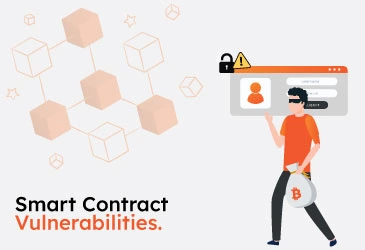Defi Vs Cefi
Updated : May 26, 2023

In the world of finance, two terms that have gained significant attention are DeFi and CeFi. DeFi stands for Decentralized Finance, while CeFi refers to Centralized Finance. These two approaches offer unique characteristics and benefits, and understanding their differences is crucial for individuals looking to navigate the ever-evolving financial landscape. In this article Defi Vs Cefi, we will explore the disparities between DeFi and CeFi, examining their features, advantages, challenges, and potential impacts.
What Is DeFi?
DeFi, as the name suggests, revolves around decentralization. It leverages blockchain technology and smart contracts to create an open and transparent financial ecosystem. In DeFi, there are no intermediaries like banks or financial institutions. Instead, transactions are conducted directly between participants on a decentralized network. You can learn about Dapps and Types Of Dapps.
One of the key advantages of DeFi is its accessibility. Anyone with an internet connection can participate, regardless of their location or background. This inclusivity has opened up new opportunities for financial services, such as lending, borrowing, trading, and investing, to a global audience. Additionally, DeFi platforms often offer higher levels of privacy and security due to their decentralized nature
Key Features of DeFi
- Decentralization: DeFi eliminates the need for intermediaries, allowing users to have full control over their funds and transactions
- Transparency: All transactions on DeFi platforms are recorded on a public blockchain, ensuring transparency and immutability
- Openness: DeFi protocols are open-source, meaning anyone can review, contribute, or build on top of them, fostering innovation and collaboration
- Programmability: Smart contract audits enable the automation of financial agreements and the creation of complex financial instruments.
- Interoperability: DeFi protocols can be integrated, allowing for seamless interoperability and the development of comprehensive financial ecosystems.
What Is CeFi?
CeFi, on the other hand, represents the traditional financial system that we are more familiar with. It relies on centralized institutions such as banks, exchanges, and brokers to facilitate financial transactions. CeFi platforms act as intermediaries, connecting buyers and sellers and providing services like custody, lending, and trading
While CeFi may not offer the same level of decentralization as DeFi, it does have its own set of advantages. Centralized platforms often have established reputations, regulatory compliance, and customer support, which can instill a sense of trust and familiarity among users. Furthermore, CeFi platforms typically offer higher transaction speeds and liquidity due to their centralized infrastructure. You can also read about how to audit smart contracts.
Key Features of CeFi
- Trust and Security: CeFi platforms are subject to regulatory frameworks and security measures, offering users a level of trust and protection.
- Customer Support: Centralized platforms usually provide customer support services, allowing users to seek assistance when needed.
- Fiat Integration: CeFi platforms facilitate the exchange between cryptocurrencies and traditional fiat currencies, making it easier to bridge the gap between digital and traditional financial systems.
- Liquidity: Due to their centralized nature, CeFi platforms often have higher liquidity and faster transaction speeds, especially during times of market volatility.
Comparing DeFi Vs. CeFi
Let's see what are the key differences between DeFi and CeFi, also have a look at their scope:
Advantages:
| Advantages | DeFi | CeFi |
|---|---|---|
| Accessibility | DeFi provides financial services to anyone with an internet connection, regardless of their geographical location or socioeconomic status. | CeFi platforms facilitate the exchange between cryptocurrencies and traditional fiat currencies, making it easier for users to transition between digital and traditional financial systems. |
| Transparency | DeFi transactions is recorded on public blockchains, ensuring transparency and audibility. | CeFi platforms adhere to regulatory frameworks, providing users with a sense of trust and security. Users can rely on established institutions and legal frameworks for dispute resolution and protection of their assets. |
| Privacy | DeFi platforms often prioritize user privacy, allowing individuals to control their personal and financial information. | CeFi platforms typically offer customer support services, allowing users to seek assistance and guidance when needed. |
| Programmability | Smart contracts enable the automation of financial agreements, reducing the need for intermediaries and streamlining processes. | Centralized platforms often have higher liquidity and faster transaction speeds, especially during times of market volatility. This can be beneficial for traders and investors who require quick and efficient transactions. |
Challenges and Risks:
| DeFi | CeFi |
|---|---|
| In the case of DeFi, its decentralized nature can present certain challenges. Smart contracts, while powerful, are not immune to bugs or vulnerabilities, and if exploited, can result in financial losses. Additionally, the absence of intermediaries means that users are responsible for their own security and must exercise caution when interacting with DeFi protocols. | CeFi platforms, although regulated and trusted, are still susceptible to centralized risks. This includes potential hacking incidents, mismanagement of funds, or even insider fraud. Users on centralized platforms also face the risk of having their accounts frozen or restricted, as these platforms have the authority to enforce KYC (Know Your Customer) and AML (Anti-Money Laundering) policies. |
The Future of DeFi and CeFi:
| DeFi | CeFi |
|---|---|
| DeFi has emerged as a disruptive force in the financial industry, with the potential to revolutionize how financial services are accessed and utilized. Its open and inclusive nature has the ability to empower individuals who are unbanked or underbanked, providing them with opportunities for financial growth and independence. Furthermore, DeFi's programmability opens doors for innovative financial products and services, such as decentralized lending and automated investment strategies. | While DeFi gains momentum, CeFi continues to play a significant role in the financial landscape. Established financial institutions are recognizing the potential of blockchain technology and cryptocurrencies, and many are incorporating them into their offerings. This convergence of CeFi and blockchain technology has the potential to bridge the gap between traditional and decentralized finance, allowing for more seamless integration and interoperability. CeFi platforms are also exploring ways to enhance their services by incorporating elements of decentralization. This hybrid approach, often referred to as "CeDeFi," combines the trust and security of centralized platforms with the transparency and accessibility of DeFi. By leveraging the strengths of both approaches, CeDeFi aims to provide users with the best of both worlds. |
Let's Transform The Way You Do Business Together!
As the financial landscape evolves, both DeFi and CeFi have their roles to play. DeFi has the potential to revolutionize the industry and empower the unbanked, while CeFi continues to bridge the gap between traditional and decentralized finance. However, the hybrid approach of CeDeFi, combining the strengths of both systems, presents an exciting opportunity for seamless integration and enhanced services.
If you're looking to leverage the power of blockchain technology, Contact us now for our exceptional blockchain development services and unlock the potential of decentralized finance. Let's transform the way you do business together!
Take control of your smart contract security - Request a professional Smart Contract Audit today and ensure the solidity of your blockchain projects
Insights

What Is A Smart Contract Audit?
Smart contracts are self-executing agreements that run on a blockchain network, allowing for secure and decentralized transactions. Smart contracts ...

Smart Contract Vulnerabilities
Smart contracts have revolutionized how we conduct transactions and execute agreements in the digital age. These self-executing programs ...

Smart Contract Audit Checklist
Smart contracts are self-executing agreements with the terms of the agreement between buyer and seller being directly written into lines of code ...